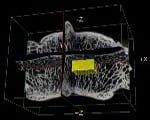The link between the federal school lunch program and childhood obesity uncovered by the research of SMU economist Daniel L. Millimet has been reported in The San Angelo Standard-Times in “Study shows obesity has complex origins.”
Writing for the Scrips Howard News Service, reporter Trish Choate quotes Millimet on the research and the link in an article that published Sept. 3 in the Standard-Times.
The research, funded by the U.S. Department of Agriculture, found that children who eat school lunches that are part of the federal government’s National School Lunch Program are more likely to become overweight.
The same research study found, however, that children who eat both the breakfast and lunch sponsored by the federal government are less heavy than children who don’t participate in either, and than children who eat only the lunch, said Millimet.
Millimet authored the study with economists Rusty Tchernis, Georgia State University, and Muna S. Hussain, Kuwait University.
The new study was published in the Summer issue of The Journal of Human Resources. It is titled “School Nutrition Programs and the Incidence of Childhood Obesity.”
Millimet is a professor and director of undergraduate studies in the SMU Department of Economics.
EXCERPT:
SAN ANGELO, Texas — WASHINGTON — A new study indicates a link between childhood obesity and school lunches, as well as a connection between healthier children and school breakfasts.
Elementary schoolchildren eating lunches at schools participating in the federally funded National School Lunch Program are more likely to become overweight, said a professor at Southern Methodist University in Dallas who co-authored the study sponsored by U.S. Department of Agriculture.
But children eating both federally funded school breakfasts and school lunches tend to be leaner than those eating only the lunch, SMU economist Daniel L. Millimet said.
“I think breakfast is a more important meal in terms of maintaining a healthy weight than lunch,” Millimet said.
Also, other studies have indicated school breakfasts comply better with government nutrition regulations than school lunches, he said.
Also covering the research is AlterNet’s Emily Badger, with the story “Do School Lunches Plump Up Poor Kids?” The story, which was posted Sept. 3, quotes Millimet on whether there’s a “causal” effect and asks “Does the National School Lunch Program make children obese, or are obese children simply more likely to sign up for the program in the first place?”
EXCERPT:
Students who participate in the National School Lunch Program are more likely to come from lower-income families or families with two working parents who don’t have time to pack a brown-bag lunch the night before. Those same students, as a quick glance around many school cafeterias this fall will show, are also more likely to be overweight.
The challenge for researchers and policymakers has been to sort out the relationship between the two.
“When you just look at those groups
[who participate in school lunch], those are groups also more likely to not be the healthiest kids,” said Daniel Millimet, an economist at Southern Methodist University. “Then there’s a question of whether or not there’s actually something causal going on, or does the perception just reflect people who are self-selecting into the program?”
In other words: Does the National School Lunch Program make children obese, or are obese children simply more likely to sign up for the program in the first place?
Read the full story
SMU has an uplink facility located on campus for live TV, radio, or online interviews. To speak with an SMU expert or book an SMU guest in the studio, call SMU News & Communications at 214-768-7650 or email news@smu.edu.
 The link between the federal school lunch program and childhood obesity uncovered by the research of SMU economist
The link between the federal school lunch program and childhood obesity uncovered by the research of SMU economist 




